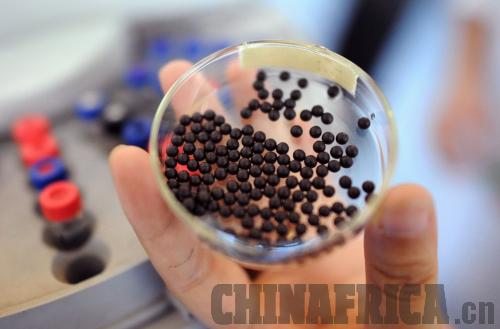|
 |
|
PILL BOX: Chinese herbal medicine can be used for angina and heart disease (LIU HAIFENG) |
Liu Tao never expected that his traditional Chinese medicine (TCM) products would be so warmly welcomed at the annual Canton Fair last year. His surprise came after a large number of African businessmen expressed a keen interest in importing the products. That knowledge left a broad smile on his face.
Liu is the senior manager of the Business Department of Pharmaceuticals at Sinochem Ningbo, a large pharmaceutical manufacturer in the country. He has every reason to be happy. His company's sales in the African market touched on nearly $5 million in 2009, with sales continuing to rise in markets such as South Africa and Nigeria.
But despite Liu's optimism, the trade of pharmaceuticals makes up only a small proportion of the rapidly expanding bilateral trade, according to Tan Shengcai, Vice President of the China Chamber of Commerce for Import and Export of Medicines and Health Products.
Chinese customs statistics show China-Africa bilateral trade volume in the pharmaceutical industry steadily rose from $199 million in 2001 to $1.14 billion in 2009, of which $1.1 billion is China's exports to Africa.
The China-Africa total trade volume in 2009 was $91.07 billion, testifying to Tan's comment.
He did however temper the hard cold facts by acknowledging that African countries are still amongst the fastest growing markets for China's medicines and health products.
About 37 countries on the continent have to date imported TCM from China. Those whose import volume of TCM reached $1 million annually include Morocco, Benin, Nigeria and South Africa.
Success secrets
China has offered decades of help to aid the combat against diseases in Africa. Its pharmaceutical companies continue to supply the continent with drugs at an affordable price. A good example of this is a private Chinese drug producer, Beijing Holley-Cotec Pharmaceuticals Co., Ltd., and their achievement in the battle against malaria.
According to figures from World Health Organization, there are at least 300 million acute cases of malaria each year globally, resulting in more than a million deaths. Around 90 percent of these deaths occur in Africa, mostly affecting the young children and pregnant women.
After more than a 10-year endeavor, the company's herb products, the Cotecxin and Duo-Cotecxin series of anti-malarial drugs, have proven to be a fast-acting lifesaver for millions of African people. This is owed to the product's effectiveness and competitive price.
Lu Chunming, General Manager of Holley-Cotec, recalled that a decade ago, one unnamed Kenyan woman managed to give birth to a baby girl with the help of anti-malaria drugs from China. As it is the custom to name children based on major events that occur at their birth, she named the baby "Cotecxin" after the drug.
"I prefer Cotecxin to Western medicine," said T. Byakika, a doctor from a Kenyan hospital. He said he used it in place of Quinine (a product long used to combat malaria) because Cotecxin is more natural and has very few side effects. Byakika said that most doctors are now choosing TCM to fight malaria due to its effectiveness, in both cost and cure.
Holley-Cotec has trained nearly 200 people, mainly from Africa and other developing countries, for malaria control in the past five years. Some of the trainees even have been promoted to ministerial level posts in their countries. Booming TCM industry boosts local employment. About 90 percent of marketing teams are Africans at the company's subsidiaries on the continent.
|